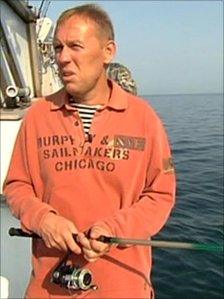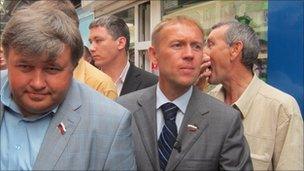Chief suspect in Litvinenko killing speaks out
- Published
The BBC's Daniel Sandford travelled to Russia's Kamchatka peninsula to speak to Andrei Lugovoi
With British Prime Minister David Cameron visiting Russia next week, the killing of ex-spy Alexander Litvinenko in London five years ago is still a major thorn in relations, as the BBC's Daniel Sandford reports from the Kamchatka peninsula.
Andrei Lugovoi gently cast his fishing rod off the boat, letting the bait drop into North Pacific on a windless day. The backdrop was spectacular. Kamchatka's volcanoes glowered over the bay. The fish he caught looked like something from the Jurassic era.
The former KGB bodyguard had taken time out from political campaigning to talk about the killing of Alexander Litvinenko, almost five years on.
He suggested a third country should be brought in to re-investigate the murder in a Lockerbie-style attempt to break the diplomatic deadlock, and suggested MI6 - and even Litvinenko himself - were responsible for his death.
Main suspect

Andrei Lugovoi remains the main suspect for Litvinenko's death
Mr Lugovoi remains Scotland Yard's main suspect in the murder. Britain's Crown Prosecution Service says there is sufficient evidence to charge him. As a result, he has not left the Russian Federation since November 2006, for fear of being extradited and put on trial.
I spent the best part of two days with him on the edge of the Kamchatka peninsula, one of the great Russian wildernesses. He seemed relaxed, but clearly frustrated that his case remains the most serious impediment to British-Russian relations.
"Are we going to fight about it for the next 100 years?" he asked. "We should be looking for a way out. And the ball is not in the Russian court, it is in the English court."
He did not mean court in the legal sense.
Radioactive poisoning
David Cameron will want to talk about business and geopolitics with President Dmitry Medvedev and Prime Minister Vladimir Putin, but he will have to press them again on sending Andrei Lugovoi for trial in Britain. Something they will have to refuse.
Alexander Litvinenko - the man Andrei Lugovoi is accused of killing - died a slow and painful death. He was poisoned by the lethally radioactive isotope polonium-210. British police believe it was dropped in his tea at the Millennium Hotel in London. He was there with Andrei Lugovoi.
Both had been in the KGB, but Alexander Litvinenko had become an outspoken critic of the Russian government and had recently become a British citizen
I asked Mr Lugovoi what he thinks now about Litvinenko's death.
"I only started thinking about it after a year, when the whole story subsided," he said. "There is no doubt that what happened was tragic. Those photographs of Litvinenko that were released were heart-rending. Whatever I thought about that man, death is always a bad thing."
Strong evidence
The evidence against Lugovoi appears strong. He was present at the crucial moment in the Millennium Hotel. Many of the other places he went to on that trip - the Emirates Stadium, the offices, even his aeroplane seat - tested positive for Polonium 210.
He concedes that things look bad, but insists Scotland Yard's Counter Terrorism Command has got the wrong man.
"If you spin it in the right way… Well, there's Lugovoi, a former officer of the Russian special services. He comes over and meets another former special services officer who dies soon afterwards, and Polonium is found all over the place. It seems obvious," said Mr Lugovoi. "But it's not a fingerprint. It's impossible to say who left the Polonium."
Scotland Yard will not say what other evidence they have against Mr Lugovoi. He insists he is a victim of Polonium contamination himself, and not a killer.
Asked who he thinks murdered Alexander Litvinenko, he insisted that the British intelligence services were involved "in an active or passive way".
"Litvinenko was an opportunist," he added. "We may presume that he was involved in the Polonium trade with the intention of staging an act of provocation or an act of terrorism. We can presume that he was handling Polonium without enough care and died as a result."
Under English law it is impossible to libel someone who has died.
Extradition refused
When Scotland Yard detectives concluded their investigation, Britain made a formal request to Russia for Andrei Lugovoi to be extradited. The Russian government refused, saying it was against Russia's constitution to extradite its own citizens.

Andrei Lugovoi is now a deputy in the Russian parliament, the Duma
Andrei Lugovoi is now a deputy in Russia's parliament, the Duma. He is a member of Vladimir Zhirinovsky's populist and right-wing Liberal Democratic Party. The chances of him being tried in Britain seem remoter than ever.
But he understands that it is difficult for diplomatic relations between Russia and Britain to improve. He suggested a third country should get involved to break the deadlock.
"In the famous Lockerbie case Britain passed a special law allowing the terrorists to be tried in the Netherlands," he said. "Listen guys, why don't we get a third country to conduct an independent investigation?"
And then, on a boat thousands of miles from Moscow, he offered me a cup of tea - black and sweet, with a slice of lemon. It seemed churlish to refuse.
- Published8 September 2011
- Published8 September 2011
- Published15 February 2011